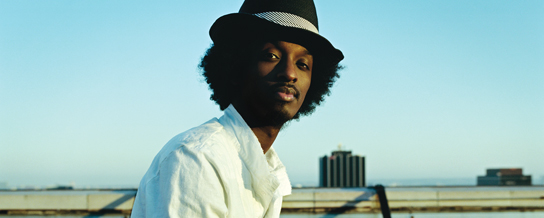K’NAAN: Lost in Translation
Like his good friend Emmanuel Jal, Somalia-born rapper/poet K’naan was exposed to civil war in […]

K’NAAN: Lost in Translation
Like his good friend Emmanuel Jal, Somalia-born rapper/poet K’naan was exposed to civil war in […]

Like his good friend Emmanuel Jal, Somalia-born rapper/poet K’naan was exposed to civil war in his native land before coming to the West as a refugee and becoming an internationally respected artist. An emissary of lyrical consciousness who combines rap, poetry, reggae, and world music influences, he’s compiled an impressive resume: He’s chastised the UN for its lackluster relief efforts in Africa, won Juno and BBC Awards for his 2005 debut, The Dusty Foot Philosopher, and collaborated with Chubb Rock, Damian Marley, Kirk Hammett, and Adam Levine on his new album, Troubadour. Though he downplays notions of an “African scene” taking over pop culture, K’naan represents a movement in and of himself, having performed everywhere from Humboldt, CA to Djibouti while eschewing commercial-rap clichés.
XLR8R: Your aunt was a singer and your grandfather a poet, and your name means “traveler” in Somali. Traveling seems to be in your soul, and music and poetry in your DNA.
K’naan: It really is. I think the naming process is pretty real.
Your new album is called Troubadour, which means ‘traveling musician.’ How have your travels influenced the music you make? It’s given me a unique perspective and therefore I think that the music I create is something that’s often hard to classify as any genre, ya know? I think that’s a result of restlessness and development as a human being.After fleeing Mogadishu, you came to New York in 1991, a time when hip-hop culture was at its peak. Is that where you got exposed to rap music? That’s kinda where I got exposed to the bulk of it. I got exposed to one album when I was still in Somalia during the war, Eric B & Rakim’s Paid in Full. But I began to hear more music in the early ’90s. Hard to Earn, that album by Gangstarr, Nas had Illmatic, Ready to Die byBiggie Smalls. That new culture-painting MC sort of defined how we are supposed to see their experiences in the world that we live in. That was kind of the most influential aspect of hip-hop to me. ’Cause [now] I had a place of my own that I sat musically. Did studying rap help you to learn English? Yeah. It helped me learn not just English as far as words, but also culture—this new culture that I was kind of a part of as a black person coming out of Africa. You know, there was a way that the world saw these artists and the communities that they come from. Coming to North America and being a visible person of color already, [it was like] I belong in that group. So it helped me that way. When people talk about “the black experience,” they usually refer to the African American experience. How does the African immigrant experience in the West fit into that? It has elements of it that are pretty much the same but it has elements which are different. With the African immigrant experience, we’re just trying to get through the daily things like language, know what I mean? Not even having language on our side, not even having properly gone through the channels of education, the opportunities are different for us. The stresses and the pressures [are different for] African immigrants: We have to take menial jobs just to support people back home. The weight I feel is sometimes even greater in a way because we’re starting at the bottom. MP3: “Strugglin”

